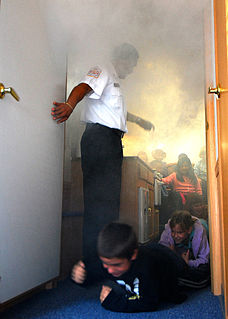
South Dakota is a U.S. state in the North Central region of the United States. It is also part of the Great Plains. South Dakota is named after the Lakota and Dakota Sioux Native American tribes, who comprise a large portion of the population with nine reservations currently in the state and have historically dominated the territory. South Dakota is the seventeenth largest by area, but the 5th least populous, and the 5th least densely populated of the 50 United States. As the southern part of the former Dakota Territory, South Dakota became a state on November 2, 1889, simultaneously with North Dakota. They are the 39th and 40th states admitted to the union; President Benjamin Harrison shuffled the statehood papers before signing them so that no one could tell which became a state first. Pierre is the state capital, and Sioux Falls, with a population of about 187,200, is South Dakota's largest city.
Education in Australia encompasses the sectors of early childhood education (preschool) and primary education, followed by secondary education, tertiary education (universities and Registered Training Organisations. Regulation and funding of education is primarily the responsibility of the States and territories, however the Australian Government also plays a funding role. Education in Australia is compulsory between the ages of four, five, or six and fifteen, sixteen or seventeen, depending on the state or territory and the date of birth.

A fire drill is a method of practicing how a building would be evacuated in the event of a fire or other emergencies. In most cases, the building's existing fire alarm system is activated and the building is evacuated by means of the nearest available exit as if an emergency had actually occurred. Fire drill procedures may vary depending on the building type, such as hospitals or high rise buildings, where occupants may be relocated within the building as opposed to evacuating the building. Generally, the evacuation is timed to ensure that it is fast enough, and problems with the emergency system or evacuation procedures are identified to be remedied.

The Texas Assessment of Knowledge and Skills (TAKS) was the fourth Texas state standardized test previously used in grade 3-8 and grade 9-11 to assess students' attainment of reading, writing, math, science, and social studies skills required under Texas education standards. It is developed and scored by Pearson Educational Measurement with close supervision by the Texas Education Agency. Though created before the No Child Left Behind Act was passed, it complied with the law. It replaced the previous test, called the Texas Assessment of Academic Skills (TAAS), in 2002.
Arizona's Instrument to Measure Standards (AIMS) was a standardized test administered by the state of Arizona. AIMS was a standards-based assessment aligned with the Arizona Academic Content Standards. In November 2014, the Arizona State Board of Education voted to replace AIMS with a new test called AzMERIT.
The Standards of Learning (SOL) is a public school standardized testing program in the Commonwealth of Virginia. It sets forth learning and achievement expectations for core subjects for grades K-12 in Virginia's Public Schools. The standards represent what many teachers, school administrators, parents, and business and community leaders believe schools should teach and students should learn. The Virginia Department of Education, schools, and school systems routinely receive essential feedback on the effectiveness of implementation and address effective instructional strategies and best practices. The Standards of Learning is supportive of and a direct response to the No Child Left Behind Act, which was signed into law by then-President George W. Bush on January 8, 2002. They address student achievement in four critical areas: (1) English, (2) mathematics, (3) science, and (4) history/social studies. Students are assessed in English and mathematics in grades 3-8 and upon completion of certain high school level courses. Science and history SOL are administered in grades 4, 5, and 8 and at the end of completing high school courses in these respective subjects.

The Higher Learning Commission (HLC) is an institutional accreditor in the United States. It has historically accredited post-secondary education institutions in the central United States: Arizona, Arkansas, Colorado, Illinois, Indiana, Iowa, Kansas, Michigan, Minnesota, Missouri, Nebraska, New Mexico, North Dakota, Ohio, Oklahoma, South Dakota, West Virginia, Wisconsin, and Wyoming. The headquarters of the organization is in Chicago, Illinois.
The Georgia High School Graduation Test, or GHSGT, was administered to all students in the eleventh grade in the US state of Georgia from 1991 to 2013. It determined whether or not a student was eligible to graduate from a Georgia high school.
The Tennessee Comprehensive Assessment Program (TCAP) is the standardized testing program used in public schools in Tennessee. Tennessee schools administer a comprehensive exam to their students at the end of each school year beginning in the third grade. Tests are intended to reflect what each child learned in the past year of school. The tested areas include reading, language arts, mathematics, science, and social studies. The TCAP currently includes the Achievement Test, the Writing Test, the Competency Test, the Gateway Tests, and the End of Course Tests. The scores are returned at the beginning of the next school year and these scores help schools make instructional decisions. Special education and limited-English proficiency students are included in the testing and may be accommodated with modifications.
The Illinois Standards Achievement Test (ISAT) measured individual student achievement relative to the Illinois Learning Standards. Results of this score were applied to the No Child Left Behind Act, for purposes of identifying failing schools. The ISAT has since been retired as a state assessment, with the 2013–2014 school year being the last time the test was administered.
The North Carolina End of Grade Tests are the standardized tests given to students in North Carolina and many other states like Georgia grades 3-8. Beyond grade 8, there are End of Course Tests for students in grades 9 to 12.
The Oklahoma Core Curriculum Tests are standards-aligned tests designed to meet NCLB requirements. The following tests are administered:
The Palmetto Assessment of State Standards is a United States standards-aligned test designed to meet No Child Left Behind (NCLB) requirements taken by students in the state of South Carolina. It is administered in grades 3–8 in writing, language arts, mathematics, science, and social studies.
The West Virginia Educational Standards Test (WESTEST) is a criterion-referenced test measured student's knowledge of the West Virginia Content Standards. It is designed to meet NCLB requirements. Tests are administered in Science, Social Studies, Mathematics, and Reading/Language Arts in grades 3-11.

The Lexile Framework for Reading is an educational tool that uses a measure called a Lexile to match readers with books, articles and other leveled reading resources. Readers and books are assigned a score on the Lexile scale, in which lower scores reflect easier readability for books and lower reading ability for readers. The Lexile framework uses quantitative methods, based on individual words and sentence lengths, rather than qualitative analysis of content to produce scores. Accordingly, the scores for texts do not reflect factors such as multiple levels of meaning or maturity of themes. Hence, the United States Common Core State Standards recommend the use of alternative, qualitative methods for selecting books for students at grade 6 and over. In the US, Lexile measures are reported from reading programs and assessments annually. Thus, about half of U.S. students in grades 3rd through 12th receive a Lexile measure each year. In addition to being used in schools in all 50 states, Lexile measures are also used outside of the United States.
Race to the Top was a $4.35 billion United States Department of Education competitive grant created to spur and reward innovation and reforms in state and local district K–12 education. Funded as part of the American Recovery and Reinvestment Act of 2009, it was announced by President Barack Obama and Secretary of Education Arne Duncan on July 24, 2009. States competing for the grants were awarded points for enacting certain educational policies, instituting performance-based evaluations for teachers and principals based on multiple measures of educator effectiveness, adopting common standards, adopting policies that did not prohibit the expansion of high-quality charter schools, turning around the lowest-performing schools, and building and using data systems.

Kristi Lynn Noem is an American politician serving since 2019 as the 33rd governor of South Dakota. A member of the Republican Party, she was the U.S. representative for South Dakota's at-large congressional district from 2011 to 2019 and a member of the South Dakota House of Representatives for the 6th district from 2007 to 2011. Noem was elected governor in 2018 and is South Dakota's first female governor. She was elected as an ally of Donald Trump. She follows conservative beliefs and opposes gun restrictions.
The Partnership for Assessment of Readiness for College and Careers (PARCC) is a consortium featuring two states, the District of Columbia, the Department of Defense Educational Activity, and the Bureau of Indian Education, that work to create and deploy a standard set of K–12 assessments in Mathematics and English, based on the Common Core State Standards.





